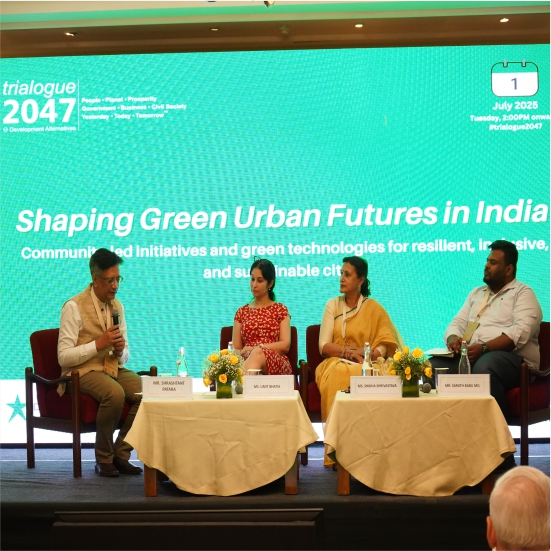
trialogue2047: Shaping Green Urban Futures explored inclusive, community-led approaches to urban transformation in the face of climate change. Experts emphasised justice, local innovation, and collaborative governance as critical to building sustainable, resilient Indian cities.
#trialogue2047
trialogue2047 in session at IHC, New Delhi
Against the backdrop of growing climate concerns and rapid urbanisation, trialogue2047 brought together changemakers, urban practitioners, and thought leaders to reimagine India’s urban future. Hosted under the theme ‘Shaping Green Urban Futures’, the dialogue focused on building inclusive, sustainable, and community-led cities.
The event began with a warm welcome from Shaila Sam, Head, Communications and Impact, Development Alternatives, who highlighted the urgency of addressing the climate crisis. This set the tone for an afternoon of compelling reflections and constructive exchange.
In his opening remarks, Dr. Ashok Khosla, Chairman, Development Alternatives, emphasised that justice must be central to development. “Without justice, every action is meaningless,” he said, urging that the future must be consciously and inclusively designed. Director, Socratus Foundation, Devjit Mishra echoed the sentiment, underscoring the need for collective wisdom and stronger narratives to shape equitable urban transformation.
The keynote address by Mr. Shombi Sharp, UN Resident Coordinator in India, spotlighted the gravity of the global situation, 83% of the SDGs are currently off track. He reflected on the vital role cities play in this journey, noting that by 2050, over 50% of the global population will reside in urban areas. In India alone, nearly 500 million people already live in cities. Urbanisation, he stressed, must be accompanied by sustainable planning, waste management, and climate resilience.
Commending India’s efforts from the Smart Cities Mission to LEED certifications and inclusive housing schemes Mr. Sharp reinforced the importance of local action. Referring to Hyderabad’s vertical “bio-wall” of 16,000 plants, he called for the identification and amplification of such scalable green innovations. “If we get it right in India,” he concluded, “the world will follow.”
The moderated trialogue session, led by CEO, Development Alternatives, Shrashtant Patara, explored how to place communities at the heart of urban planning. Shikha Shrivastava from TATA Trusts shared experiences from working in under-resourced towns, where informal workers are the most affected by climate stressors. She advocated for co-created solutions like green roofs and water source revival, and stressed the need for participatory climate action plans.
Lead – Technology, Data Solutions and Innovation, NIUA, Mr. Sarath Babu MG elaborated on the government’s climate governance framework, which now covers 226 cities. While the framework has led to reforms like the creation of “climate cells” and encouraged mentorship between cities, he acknowledged the lack of integration of social vulnerability indicators, something that must be addressed going forward.
Senior Director, Sustainability Strategy Asia Pacific at JLL, Ms. Umit Bhatia reflected on the real estate sector, cautioning against greenwashing and highlighting the need for ethical practices that benefit both investors and communities.
As the session concluded, three key actions were proposed: embed participatory culture in governance, enable local innovation, and create urban living labs. In the open discussion, speakers urged for stronger collaboration, knowledge-sharing, and a shift from working in silos.
Reflecting on the dialogue, Zeenat Niazi from Development Alternatives emphasised the need for systems that recognise and integrate local wisdom. “Cities are built not just by architects or administrators, but by the people who live in them,” she noted. The discussion also raised questions around the feasibility of implementing an “economy that cares” and Extended Producer Responsibility (EPR) within the current societal framework.
trialogue2047 reaffirmed a powerful message: the future of our cities lies in inclusive planning, grassroots leadership, and sustainable, just action.
Glimpses from trialogue2047 held at IHC, New Delhi
Glimpses from trialogue2047 held at IHC, New Delhi
Glimpses from trialogue2047 held at IHC, New Delhi